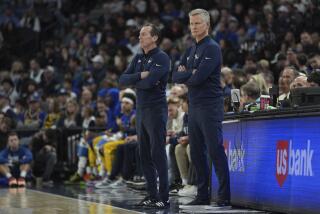Pitino Is Happy With the Knicks, but He Can’t Help Looking Back
- Share via
Just because Rick Pitino has decided that he really does want to continue to be a professional coach, it doesn’t mean he doesn’t miss the pizza parties at Providence College.
The nature of the Knickerbockers he’s coaching makes the transition less abrupt, but that doesn’t mean he doesn’t look back.
“I’m here as long as the Knickerbockers will have me,” he said Thursday on the brink of his second season opener. That statement was the product of a deliberate and measured decision.
From the outside looking in, the first season looked like a honeymoon. There was nowhere to go but up, and he went up. But there were times when he felt if he hadn’t given his word to the Knicks, he would have gone back in a minute.
“It’s easy for people to say you can’t look back,” Pitino reflected. “Anytime you leave a situation where you were so happy, it’s inevitable. There was a very big temptation to go back.”
He is a child prodigy of sorts. He’s just 36 years old and could pass for younger. His manner is boyish. He still plays three-on-three basketball games every chance he gets. He still remembers the charisma of the glory years of the franchise through the memory of a teen-ager. “If I had it to do all over, knowing what I do now, I’d still want to coach the Knicks,” he said.
But he had moved so quickly to the top at Providence. He took the team to the National Collegiate Athletic Association Tournament’s Final Four in his second season. His lament was that his family wasn’t ready to move again so quickly and that professional opportunity knocked too soon. “Two years there wasn’t enough,” he said. “It was such a good situation. But I grew up in New York; I could never turn down the Knicks. So it was a Catch-22.”
He misses the pizza parties that brighten college coaching. He even misses the recruiting so many coaches hate. “I loved dealing with young people,” he said. “I really am trying to have some of the same situation with the Knicks I had with Providence.”
And, of course, Pitino knows that’s impossible. The pros are too good and too cynical. They make more money than the coach and have longer contracts, and they know losing players usually survive losing coaches. When they sense a misfitting coach, they can devour him.
“There are things I can’t do here,” Pitino said. “If I wanted to change Rod Strickland’s thinking, I’d have to spend a whole lot of time with him one-to-one. I can’t do that. What you have to do is mold a team’s character, not the individual.
“In college you spend so much time with the players, you get to know each of them. Here, I try to be there as part of their lives when they need me. But they’re adults; you have to let them be themselves.”
Last season was what General Manager Al Bianchi calls “a gimme” because almost anything would have been an improvement. But Pitino had his personal tragedy with the death of his infant son. His professional trauma was in the ability to immediately reverse the tone of the team only in the most subtle ways.
“I was trying to bring out the boyish qualities of the players,” Pitino said. “You never see professionals hug.”
For the longest time the Knicks couldn’t win a game on the road. The playoffs looked as remote as the North Pole. “Early in the year we called a timeout and heard the booing,” he said. “Then I said, ‘What the hell have I gotten myself into?’ ”
Things began to come together. Mark Jackson was a phenom, and he drew flashes of the best from Patrick Ewing. And the game they had to win, they won. Pitino found the strain of youth in them. “When we beat Indiana (to make the playoffs), we had guys hugging and rolling on the floor, they were so happy,” he said. “I love that enthusiasm.”
They handled themselves well in the playoffs. They lost three of four to the Celtics, but the Knicks deserved their standing ovation. For a week it was like old times.
Pitino learned his lessons while he was teaching them. First, by his count, he learned some flexibility. He learned to deal with the media, which were mostly favorable but can never be 100 percent favorable any more than the Broadway critics can be.
He recalled his time as an assistant to hypersensitive Hubie Brown: “Hubie read every article in every paper every day, and about the littlest thing he’d say, ‘How can he say that?’ ”
He advised the players that press reaction in the pros wouldn’t be the same as the boosterism at Kentucky or Virginia. Athletes have a way of reading 90 percent favorable notices and seeing only the 10 percent critical. “I told them that when we shoot 60 percent, we’re ecstatic,” Pitino said, “so if we get press that’s 70 or 80 percent favorable, be happy. Don’t look at the negatives.
“People were fair with us. They appreciated the hustle.” Indeed, the Knicks hustled. They and the coach grew together.
Now what do they do for an encore? It’s an expansion year, so of course they’ll win more games. But so will everybody else. The goal is to get to the playoffs with a chance to win something.
More to Read
Go beyond the scoreboard
Get the latest on L.A.'s teams in the daily Sports Report newsletter.
You may occasionally receive promotional content from the Los Angeles Times.










